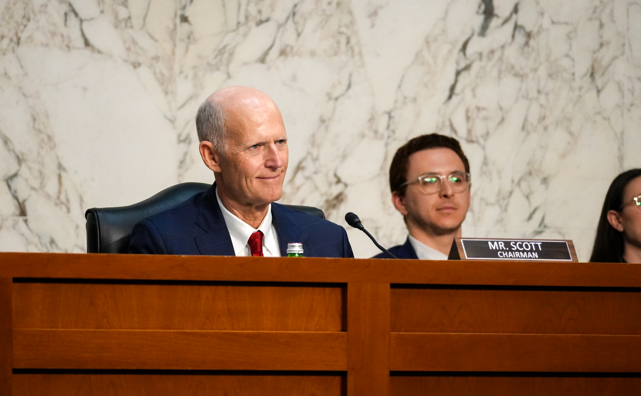VIDEO RELEASE Chairman Rick Scott Leads Aging Committee Hearing on Combating Rising Antisemitism and Protecting America’s Seniors
WASHINGTON, D.C. – Yesterday, Senator Rick Scott, Chairman of the U.S. Senate Special Committee on Aging, led a committee hearing entitled, “Never Again: Addressing the Rise of Antisemitism and Supporting Older Americans” as Jewish American Heritage Month begins today. The committee welcomed testimony from leaders on the frontlines of combating antisemitism including David Schaecter, a Holocaust survivor, founder of the Holocaust Memorial Miami Beach, and president of the Holocaust Survivors Foundation USA, along with Rabbi Mark Rosenberg, who serves as a law enforcement chaplain and liaison, and former Congressman Ted Deutch, who is now CEO of the American Jewish Committee. These witnesses shared compelling personal accounts and expert insight into the severity of the issue while stressing the importance of a united response across all levels of government to help safeguard the well-being of older Jewish Americans.

Watch Chairman Scott’s full remarks HERE. Read Chairman Scott’s remarks as prepared for delivery below:
“The U.S. Senate Special Committee on Aging will now come to order.
Today, we are gathered to address an issue that has been weighing heavily on the hearts and minds of many—one that affects a significant portion of our aging population: antisemitism.
This hearing is especially timely as we reflect on Passover and the time of renewal for the Jewish community, and prepare to recognize Jewish American Heritage Month in May.
The recent surge in antisemitic incidents, including harassment, violence, and vandalism, has become an alarming trend, especially impacting elderly Jewish Americans, including Holocaust survivors.
These individuals, many of whom have already endured the horrors of persecution, are now facing renewed threats that retraumatize and destabilize their lives.
Antisemitism is not a distant historical issue—it is an ongoing reality that continues to rise in our society.
Older Jewish Americans overwhelmingly recognize the increasing threat of antisemitism. In fact, according to the American Jewish Committee’s 2024 State of Antisemitism in America report, 96% of Jewish Americans over the age of 65 recognize that antisemitism is a problem in the U.S. today.
More than 94% of Jewish Americans aged 50-64 report an increase in antisemitism over the past five years.
43% of Jewish Americans over 50 have avoided wearing Jewish symbols or publicly identifying as Jewish out of fear.
These statistics are not just numbers; they represent lives, families, and communities being impacted by fear and violence.
Beyond the statistics, elderly Jewish individuals have faced direct acts of aggression.
In recent years, reports have surfaced of elderly Jewish individuals being harassed in public, attacked at protests, and even killed in antisemitic incidents.
A Holocaust survivor in New York was spat on and verbally abused.
In California, Paul Kessler, a 69-year-old Jewish man, was struck on the head with a megaphone by a pro-Hamas protestor, was hospitalized in critical condition, and eventually died from blunt-force trauma. That is absolutely despicable.
Such incidents have heightened concerns among older Jewish communities, particularly Holocaust survivors, for whom these events retraumatize past experiences of persecution.
In my home state of Florida, we have a large population of both seniors and Jewish individuals so this is deeply important to me.
In our first hearing of this new Congress, I outlined my priorities for the committee to ensure the wellness of American seniors and broke it down into four key issues:
- Achieving physical and mental health;
- Establishing financial stability;
- Living in a safe community; and
- Securing family and community support systems.
If you are afraid of being targeted just because you are Jewish, how could you possibly achieve these things?
If you believe you could be attacked on the street simply because you are wearing a Star of David, or a yarmulke, and you don’t feel safe going out for a walk or out to the gym to exercise…do you really have strong physical and mental health?
Can you really say that you’re able to live in a safe community? Or that you can build a community support system when you feel isolated?
When you think about the true impacts that antisemitism, or any hate, has on people every single day, you realize it disrupts every part of their lives.
As we face these challenges, it is crucial that we listen to those directly affected.
Today, we are fortunate to hear from three remarkable witnesses whose experiences, expertise, and commitment to the safety and prosperity of the older Jewish community and Jewish community at large, provides invaluable insight into this growing crisis.
Their voices will help us understand how we can better protect our elderly Jewish citizens and ensure their safety in their communities.
We will hear from individuals who have witnessed and lived through these horrors, including a Holocaust survivor, who will share their personal stories and perspectives. These stories are not just a reminder of our shared history—they are a call to action, urging us to stand together as a country and as a congressional body and work to eliminate the rising tide of hate.
I believe that this issue is not just one for Jewish communities to address but one that requires our collective action.
This is a bipartisan issue that requires a unified response, and today we will explore the steps Congress can take to combat antisemitism and protect seniors.
We must act with urgency, because every day that we allow hate to grow unchecked, we risk the safety and dignity of our fellow Americans, especially our most vulnerable senior population.
I look forward to hearing from our witnesses today and working with my colleagues across the aisle to take meaningful action against this persistent threat.”
###